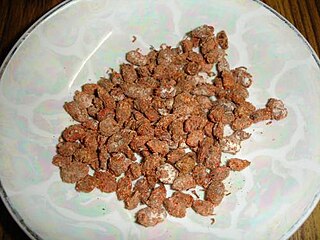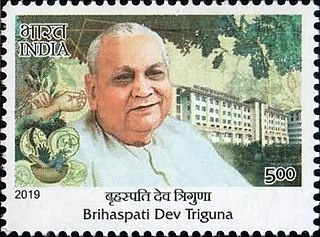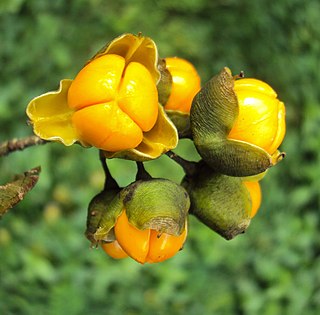
Ayurveda is an alternative medicine system with historical roots in the Indian subcontinent. It is heavily practiced throughout India, Nepal, Bangladesh, Pakistan and Sri Lanka, where as much as 80% of the population report using ayurveda. The theory and practice of ayurveda is pseudoscientific and toxic metals such as lead are used as ingredients in many ayurvedic medicines.
Maharishi Vedic Approach to Health (MVAH) is a form of alternative medicine founded in the mid-1980s by Maharishi Mahesh Yogi, who developed the Transcendental Meditation technique (TM). Distinct from traditional ayurveda, it emphasizes the role of consciousness, and gives importance to positive emotions. Maharishi Ayur-Veda has been variously characterized as emerging from, and consistently reflecting, the Advaita Vedanta school of Hindu philosophy, representing the entirety of the ayurvedic tradition.

Unani or Yunani medicine is Perso-Arabic traditional medicine as practiced in Muslim culture in South Asia and modern day Central Asia. Unani medicine is pseudoscientific. The Indian Medical Association describes Unani practitioners who claim to practice medicine as quacks.

Brihaspati Dev Triguna (1920–2013) was a Vaidya or Ayurveda practitioner and an expert in Pulse diagnosis. He completed his formal ayurvedic studies under the guidance of Rajvaidya Pandit Gokul Chand ji in his Gurukul from Ludhiana.

Commiphora wightii, with common names Indian bdellium-tree, gugal, guggal, guggul, gugul, or mukul myrrh tree, is a flowering plant in the family Burseraceae, which produces a fragrant resin called gugal, guggul or gugul, that is used in incense and vedic medicine. The species is native to western India, from where it was introduced westward to southern Pakistan and the middle-east. It prefers arid and semi-arid climates and is tolerant of poor soil.

Eclipta prostrata, the false daisy, is a species of plant in the family Asteraceae. It is widespread across much of the world.
Bachelor of Ayurvedic Medicine and Surgery (B.A.M.S.) is a professional degree focused on Ayurveda offered in India, Nepal, Bangladesh, and Sri Lanka.
Baidyanath Group is an Ayurvedic pharmaceutical company in India.

Vaidya Suresh Chaturvedi (1928–2017) was an Ayurveda practitioner from Rajasthan, India. Previously he was a professor at Bombay University and has written many books on Ayurveda. In 2000, he was awarded the Padma Shri, the fourth highest civilian award in the India. As an active practitioner of the ancient science of Ayurveda (healing), he is known in the national and international arenas of alternate medicines and has presented numerous papers. He has held a number of conferences in India. He was, a Ph.D guide in the University of Mumbai.
Vaidyaratnam P. Sankunni Varier was an Ayurveda practitioner from what is now Kerala, India. He is well-regarded as the founder of Kottakkal Arya Vaidya Sala, a major Ayurvedic treatment centre in Kerala.

Celastrus paniculatus is a woody liana commonly known as black oil plant, climbing staff tree, and intellect tree. This climbing shrub grows throughout India at elevations up to 1,800 m (5,900 ft).

The AVP Research Foundation was established in 2003 as a research department under The Ayurvedic Trust and became an independent not-for-profit research institution registered under section 25 of The Companies Act, 1956 in 2012. The foundation is known for its excellence in clinical research on Ayurvedic medicines, initiatives on practice based evidence, developing research and education oriented software for Ayurvedic fraternity and its journal indexing service in Ayurveda. The department of scientific and industrial research, Government of India has recognised the institution as a Scientific and Industrial Research Organisation.
Rajagopalan Krishnan Vaidyan was an Indian ayurvedic practitioner from the Indian state of Kerala and the president of the Association of Ayurvedic Physicians of Kerala.

Arya Vaidya Sala, popularly known as Kottakkal Arya Vaidya Sala, is a healthcare centre located in Kottakkal, in the Indian state of Kerala, providing services under the Indian traditional medicine system of Ayurveda.
Vaidya Balendu Prakash is an Indian Ayurveda practitioner. He is a former physician to the President of India and the founder of Paadav, a specialty Ayurvedic hospital in Dehradun. The Government of India awarded him the fourth highest civilian award of the Padma Shri in 1999.
Devendra Triguna is an Indian Ayurveda practitioner, known for his expertise in Pulse diagnosis. He is a former honorary physician to the President of India and the incumbent president of the Association of Manufacturers of Ayurvedic Medicine (AMAM) and the All India Ayurvedic Congress (AIAC). The Government of India awarded him the fourth-highest civilian award, the Padma Shri, in 1999, and followed it up, a decade later, with the third-highest honour of the Padma Bhushan in 2009.
P. R. Krishna Kumar was an Indian Ayurveda expert and managing director of The Arya Vaidya Pharmacy (Coimbatore) Ltd. He established The Ayurvedic Trust, overseeing AVCRI and AVP Research Foundation, a non-profit organisation promoting research in the Ayurveda. He was the chancellor of the Avinashilingam University, and the chairman of CARe Keralam, a resource centre involved in efforts to standardise Ayurvedic medicines. The Government of India awarded him the fourth-highest civilian honour of the Padma Shri, in 2009, for his contributions to Ayurveda.
Vaidya Bhagwan Dash was an Indian author and scholar in the field of Ayurvedic and Tibetan Medicine.
Pankajakasthuri Herbals India Private Limited is an Ayurvedic medicine manufacturing company based in Tiruvananthapuram, Kerala. Established in 1988, Pankajakasthuri manufactures and develops Ayurvedic products and medicines. Pankajakasthuri is Kerala's first ISO 9000 certified Ayurvedic medicine manufacturing company.

The medical ethnobotany of India is the study of Indian medicinal plants and their traditional uses. Plants have been used in the Indian subcontinent for treatment of disease and health maintenance for thousands of years, and remain important staples of health and folk medicine for millions. Indians today utilize plants for both primary medical care and as supplementary treatment alongside modern medical science. It is estimated that 70% of rural Indians use traditional plant based remedies for primary healthcare needs. This reliance of plants for medicine is consistent with trends widely observed in the developing world, where between 65% and 80% of people use medicinal plant remedies.









